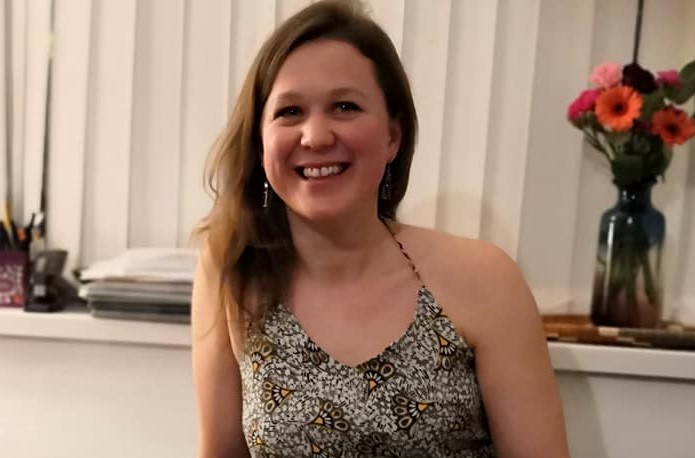By Dr Sarah Chukwuma, Obstetrics and Gynaecology Registrar (ST5) and Global Health Fellow
In this blog, Sarah shares her experiences of working within our Kampala – Cambridge working to improve maternal and neonatal health partnership and working on equity and inclusion.

Sarah is an Obstetrics & Gynaecology Registrar (ST5) and Global Health Fellow in the East of England. Motivated by a desire to reduce rates of maternal mortality globally, Sarah embarked on her training in Obstetrics and Gynaecology following a year working as a Reproductive Health Manager in South Sudan.
The mutual benefit of Health Partnerships
The East of England Global Health Fellowship presented an exciting opportunity to further pursue my passion in global maternal health, whilst continuing my specialty training in Obstetrics & Gynaecology. The fellowship provides the opportunity to work alongside one of the pre-established Health Partnerships, which are based on ideas of reciprocal learning (skills, ideas, innovation) and mutual benefit.
When discussing with my supervisor which partnership I would like to work with and having previously worked in East Africa (including Uganda) I jumped at the opportunity to work with the Kampala – Cambridge partnership that is centered around reducing rates of maternal mortality. Colleagues in Uganda had already collected data derived from a retrospective maternal death cohort at the largest maternity hospital in Sub-Saharan Africa, and previously written a report on preventing death following unsafe abortion (https://doi.org/10.1016/j.xagr.2021.100039). However, due to time constraints and clinical commitments, they welcomed my input to further analyse the data and write a paper on preventing maternal deaths due to uterine rupture for submission to a scientific journal.
Sharing knowledge & reducing maternal mortality
Rates of uterine rupture are increasing worldwide as more women accumulate relevant risk factors. The depth and size of our study allowed us to derive key findings and implementable recommendations suitable for low and middle-resource obstetric settings to help prevent maternal deaths from uterine rupture. Along with the team, I am excited by the prospect of having this work published, which we hope will be of benefit in similar healthcare settings across Sub-Saharan Africa and beyond, and ultimately to help reduce maternal mortality.
This is the first time I have had hands-on experience in writing a scientific paper for publication and have been grateful to our colleagues in Uganda who agreed to the collaboration and my committed supervisor who has guided me through this process. It has opened my eyes to the world of academia and research, which I know will be of benefit to me professionally as I develop my career.
As part of the fellowship, we are encouraged to become advocates for Global Health within our specialty, and I hope that through organising an Obs & Gynae Deanery Teaching Day on Global Health (that will be delivered later this month) we will inspire and equip others within the specialty to pursue an interest in Global Health.
Tackling Racial Discrimination through research, policy, and practice
On March 21st the UN celebrated International Day for the Elimination of Racial Discrimination. The UK’s health research unfortunately has not escaped issues of racism (and other forms of discrimination including according to gender, sexuality, class); from funding bodies to peer reviewed journals where advantage is routinely attributed to people racialised as white, often leading to policies and guidelines that perpetuate racial inequality and discriminatory practices which have real consequences, especially for people of colour. Health Partnerships, conducted in an anti-racist and ethnically conscious way, can contribute towards equity and inclusivity.
Equity and inclusivity, moreover, have increasingly become recognised as fundamental to all aspects of health care provision and service, not least within the East of England, whose most recent theme for their Spring Symposium was ‘Advancing Equity and Inclusivity’. At this event in March, I, alongside another Global Health Fellow and the Director of Cambridge Global Health Partnerships gave a presentation on Global Health activities within the region. An important aspect of this work is the work that colleagues are doing to support International Medical Graduates. We hope that by raising the profile of Global Health amongst the trainers and trainees we will contribute towards these efforts.
Similarly, the Royal College of Obstetricians and Gynaecologists are increasingly acknowledging and advocating for health equity, for example through their ‘Race Equality Taskforce’. This is particularly important considering the most recent findings of the MBRRACE-UK Saving Lives, Improving Mother’s Care report published in 2021 that ashamedly states black women are four times more likely (& women from mixed ethnicity are two times more likely) to die in pregnancy or the puerperium compared to white women in the UK.
If you are interested in supporting CGHP, please follow the donate button or contact the team.
Return to blogs
